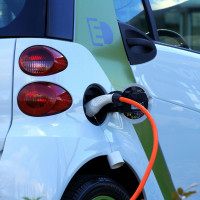In Serbia, the EU’s Green Deal is fuelling pollution and human rights abuses
Topics
Lithium mining in Serbia pits locals against corporate giants like Rio Tinto and the EU’s green ambitions. With water supplies at stake and authoritarian tactics on the rise, the conflict in the Jadar River valley reveals the human cost of the energy transition.

Photo: Mašina
Serbians have been standing up to lithium miners in their country for years. These include Rio Tinto, one of the largest extraction companies in the world, which critics accuse of collaborating with the European Union to turn Serbia into a mining colony. “This project is putting public safety at risk”, opponents say.
The extraction of resources like oil, gas, cobalt and nickel is linked to numerous problems, from expropriation and displacement of local populations, to pollution of water and soil. Governments regularly resort to authoritarian tactics and human rights violations to suppress protests and push forward with unpopular projects. Multinational corporations exploit free trade agreements and put their own interests and profits ahead of the wishes of local populations.
At a planned mining site in the Jadar River valley in western Serbia, all of these problems have reached the tipping point. For years, the British-Australian mining company Rio Tinto has been planning to mine here for lithium, a mineral that is essential for electric car production. In response, hundreds of thousands of Serbians have risen up to voice their concerns about being displaced or falling victim to water pollution. Their worries are not unfounded: a peer-reviewed study in Scientific Reports shows that lithium mining poses “a constant threat of pollution” to groundwater. Around 2.5 million people in Serbia – nearly a third of the country’s population – depend on this water.
Still, Rio Tinto refuses to budge. They made this perfectly clear in 2021 when they sued the Serbian government after it initially blocked the project. The company based its claim on a free trade agreement between Serbia and the United Kingdom, which includes an investor-state dispute settlement (ISDS) clause. This allows Rio Tinto to claim financial damages in a secret tribunal for losses it would incur if the mine were cancelled.
After months of protest, Serbian President Aleksandar Vučić effectively put an end to Rio Tinto’s grandiose project in 2022 – or so it seemed. Now, like a zombie, the lithium mine plan has come back to life, though it is unclear whether Rio Tinto’s threatened lawsuit played a role. In July 2024, Serbia’s Supreme Court granted Rio Tinto a permit to start the project. Days later, the European Commission signed an agreement with Serbia on the future supply of lithium to the European Union. Prominent attendees included European Green Deal Commissioner Maroš Šefčovič and German Chancellor Olaf Scholz, both of whom have their eyes on Serbia’s lithium reserves. As a stand-in for Germany’s powerful car manufacturers, Scholz is trying to help the sector shift to electric vehicles. Volkswagen, the flagship of the German auto industry, has repeatedly sounded the alarm over competition from China and hinted at mass layoffs. Meanwhile, the company made nearly €18 billion in profit in 2023 – a rise of more than 13% compared to the previous year.
Serbia is under threat of becoming a mining colony for the European Union.
Rio Tinto also has close ties to powerful policymakers. According to Lobbywatch, the company has repeatedly lobbied Šefčovič about the Jadar project. During a 2021 meeting, Rio Tinto and Šefčovič met to discuss “raw materials” in Serbia, with talks continuing in January 2024 at the World Economic Forum in Davos. Europe’s stance aligns with the new Critical Raw Materials (CRM) Act, which aims to secure the EU’s supply of materials, particularly for the “green transition” it envisions. However, by sourcing materials outside its borders, the EU is pursuing a green agenda that actually fuels pollution and human rights violations. Can this “green” agenda truly live up to its name when Europe’s mining practices are tainted with the “black” of pollution and the “red” of bloodshed?
Criminalising resistance
The people of Serbia are not bowing to the EU’s ambitions. They are once again taking to the streets in droves to stop the Jadar lithium mine from becoming a reality. “Serbia is under threat of becoming a mining colony for the European Union”, says economist Aleksandar Matković. He is a prominent figure in the protest movements against mining in the Jadar River valley and has published writings about the project’s negative effects on public health and the environment. He also refutes claims that the project will bring economic growth and prosperity to Serbia. “There is no correlation between increased foreign investment and improved living standards for the people of Serbia”, Matković explains. Foreign investment in mining rose from €26 million in 2014 to €704.8 million in 2023 – 27 times more than in the previous decade. During the same period, GDP growth stagnated, says Matković. Predictions for the future are also bleak. In 2022, Le Monde Diplomatique reported that Rio Tinto would earn €4 billion from the Jadar mine in ten years, while the mining permit would only generate €300 million for Serbia’s treasury.
Matković says the Jadar project is not an isolated case. Nine organisations from Portugal, Germany, Chile, Spain and Serbia have signed a declaration he drafted, expressing solidarity in their shared fight against lithium mining. They see recurring patterns: the push to transform Germany’s car industry from combustion engines to electric vehicles is leaving people displaced, environments polluted and profits pocketed without benefiting local populations.
We were put on a list of ‘eco-terrorists’ by an organisation. One of my friends, five months pregnant, had her home searched by the anti-terror unit.
Matković’s outspokenness has made him a target. Since August, he has been receiving anonymous death threats. “We will follow you until you disappear, bastard,” read one message from a Telegram account. Weeks later, during a lecture in Croatia, he received another threat – this time the sender claimed to be only 500 metres away. Matković remains calm but sees these threats as part of the broader context of growing repression and criminalisation of resistance to the Jadar mine. “We were put on a list of ‘eco-terrorists’ by an organisation. One of my friends, five months pregnant, had her home searched by the anti-terror unit”, he says. Matković says he is witnessing the government becoming more authoritarian as protests carry on. “At the moment, I am safe, but I fear for our country because this project is putting public safety in danger”, he says.
Recent reporting by UK-based human rights group Global Witness has also revealed how dangerous it is to resist resource extraction. According to their research, at least 196 environmental and human rights defenders were murdered worldwide in 2023. Twenty-five of them were protesting against mining projects, mainly in Latin America.
Investment in public transport and infrastructure
On 16 October, Matković and others spoke before the European Parliament, urging members to reconsider the EU’s support for the lithium mine. “The green transition will be viewed differently by EU voters if it becomes clear that ‘green plans’ actually result in pollution, death threats, violence, and authoritarian regimes”, said Matković. In a statement, the European Greens expressed their support for the Serbian protest movement, saying they find it unacceptable that the profits go to Rio Tinto, while the local population and environment are subjected to major impacts. “Let’s not repeat the mistakes of the past, when the hunt for key resources for energy led to pollution and the undermining of societies”, said Thomas Waitz, Austrian co-chair of the Greens in the European Parliament. He is advocating for the EU to help resource-rich countries extract, process and recycle materials in ways that align with EU standards, while prioritising the rights of communities, nature and biodiversity.
Matković welcomes the support, but is also critical of the Greens’ position, which he sees as a continuation of the capitalistic approach to extracting and using resources. They are still driven by competition, he says, while better solutions could be achieved through coordination and planning. “It’s still about getting more people to buy cars, which benefits private companies. If we want a true green transition, we have to start focusing on what’s best for citizens – not corporations.” In an article for the Serbian newspaper Danas, Matković outlined the direction he believes the country should take: “The public narrative is that electric cars are a miracle cure for the climate problem, but that’s not true. What we need is more investment in public transport and infrastructure.”



